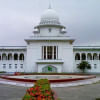We need a local government reform commission

On September 11, the interim government announced that it would form six separate commissions to carry out reforms in six critical areas: electoral system, police administration, judiciary, anti-corruption system, public administration, and the constitution. There are some other vital areas that may require closer assessment followed by reform efforts, one of which is the local government sector. There is a general consensus in the country about the need to strengthen local government institutions to improve public representation in governance, service delivery and an accountability mechanism.
It is assumed that while the commission to reform the electoral system might cover local government elections, and the one on public administration may also cover it partly, there are many other aspects of this sector that need review and reform in order to improve its overall operation. It is evident that the local government system in Bangladesh functions quite poorly and people do not get the required benefits from it. One of the reasons for that is that, compared to the central government, the local government is not sufficiently funded. Its total annual expenditure varies between seven and eight percent of the total public expenditure.
Therefore, a local government commission is needed to propose measures to strengthen the local government system. After a democratically elected government came to power in 1991, an 18-member commission was formed to thoroughly examine the local government system and suggest improvement in the structure. Again, the government that came to power in 1996 formed another local government commission. Both the commissions suggested reforms in the system, but those were not properly implemented.
The local government bodies in Bangladesh—union parishads, upazila parishads, zila parishads, hill district councils, city corporations, and municipalities—have specific responsibilities as they are closest authorities to the public and most conversant with local needs and realities. Bangladesh has a unitary system of government with constitutional obligations of local bodies to provide various services to the people within their jurisdictions. Due to this, as per the local government laws, many responsibilities have been entrusted upon the local government bodies. The theory of decentralisation is premised on the principle of allocating public functions to those levels of government which can shoulder them in the best possible manner. Based on the notions of economies of scale and spatial incidence of benefits, certain public functions—such as water supply, sanitation, road and drain construction and maintenance, street lighting, public health, tree plantation, management of bus and truck terminals, slum improvement, etc—are best placed at the local level.
Bangladesh has a fairly long history of both rural and urban local government institutions. The Bengal Village Chaukidari Act, 1870 was the first law to institutionalise the traditional panchayat system in the country. The panchayat was constituted of five non-elected members and was responsible for running the night watch system in the villages and collecting taxes to defray the expenses related to this service, i.e., the salary of watchmen. The next legislation was Bengal Local Self-Government Act, 1885, enacted to provide wider responsibilities. Union committees were formed under this legislation. A second layer, the district board, was added under this legislation. The third important legislation was Bengal Village Self-Government Act, 1919, under which union boards (abolishing union committees) with provisions of one-third elected members and district boards with two-thirds elected members were introduced.
Under the Bengal municipal acts of 1864, 1876 and 1884, municipal governments (town committees) started to operate in Bengal. The 1884 law introduced provision for elected representatives in the urban local bodies. The Bengal Municipal Act, 1932 increased the autonomy of urban local bodies.
During the Pakistan period, local government laws retained union panchayat and zila boards and after independence, the Bangladesh government continued with the same structure until 1976, when a three-tier local government structure—at union, thana and zila levels—were adopted. The upazila system at the thana level with elected representatives was introduced through a new local government ordinance in 1982. Currently, all local government bodies are administered under the Local Government Act, 2009.
The constitution is the legal basis for establishing local government in Bangladesh. The potential importance of local governments was recognised immediately after independence. Article 59 (1) of the constitution specifically states, "Local government in every administrative unit of the Republic shall be entrusted to bodies composed of persons elected in accordance with law." Article 59 (2) states, "Everybody such as is referred to in clause (1) shall, subject to this Constitution and any other law, perform within the appropriate administrative unit such functions as shall be prescribed by Act of Parliament, which may include functions relating to: (a) administration and the work of public officers; (b) the maintenance of public order; and (c) the preparation and implementation of plans relating to public services and economic development." Article 60 stipulates, "For the purpose of giving full effect to the provision of Article 59, Parliament shall, by law, confer powers on the local government bodies referred to in that article, including the power to impose taxes for local purposes, to prepare their budgets, and to maintain funds." Article 11 states that "effective participation by the people through their elected representatives in administration at all levels shall be ensured."
The issues around the local government are many, but the most important ones are: i) controversy over party-based election to local bodies; ii) huge gap between responsibilities and resources, causing frustration among the elected representatives and dissatisfaction among the people; iii) discrimination in allocation of public funds to local bodies; iv) shortage of manpower, no recruitment in vacant positions, and low-skilled staff; v) low compliance on the required stakeholder participation which results in misplaced prioritisation of projects; v) challenges in producing accurate budget and accounts, and management of assets; vi) lack of emphasis on environment and climate change issues and inclusivity in local bodies; vii) poorly managed local information base which is inaccessible to the public; and viii) use of archaic auditing method for finance and projects.
The central government alone cannot take the responsibility of development and service delivery for the large population of Bangladesh. Therefore, building a stronger local government system has been a key focus in five-year plans although adequate measures have not been taken to that end. The local government bodies are well-known for their poor capacity. In this respect, the local government entities must be strengthened so that they are capable of undertaking their developmental and service delivery responsibilities. It is thus proposed that a local government commission be formed by the present interim government to review in details the strengths and weaknesses of the local government bodies and recommend the required improvements for better functioning.
Dr Nawshad Ahmed, a retired UN official, is an economist and urban planner.
Views expressed in this article are the author's own.
Follow The Daily Star Opinion on Facebook for the latest opinions, commentaries and analyses by experts and professionals. To contribute your article or letter to The Daily Star Opinion, see our guidelines for submission.

 For all latest news, follow The Daily Star's Google News channel.
For all latest news, follow The Daily Star's Google News channel. 











Comments